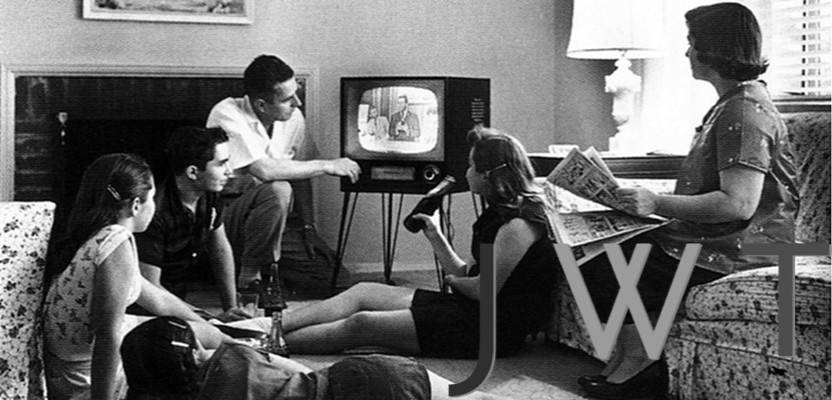TV advertising might have been largely supplanted by online ads and social media in the last few years, but as long as television adheres to the same model (in others words, before Netflix-style streaming on-demand becomes the rule rather than the exception), the classic 30 to 90 second TY spot will always have a place in ad land. Indeed, to this day, TV ads still have the power to become pop culture phenomenons in and of themselves. Just look at the “Compare the Meerkat” ads or the yearly Christmas John Lewis extravaganzas for proof.
To underline the continued importance of TV spots in adventuring, a fascinating new piece of research was unveiled this morning, celebrating the form’s 60-year history in the UK, coinciding with the anniversary of the launch ITV, which showed the first UK TV ad on 22 September 1955. The research, which was undertaken by JWT Intelligence, who surveyed 1,010 UK individuals over the age of 18, and aimed to measure how consumers’ feelings on TV advertising have changed in the last six decades. They reveal that consumers think modern advertising is more effective, with 64% agreeing with the statement; “Ads are now more effective at selling than they used to be” and 54% agreeing that “Companies speak more directly to me through TV ads these days.” They also found that 24% find ads these days more sexist, 33% find them to be more stereotyped, and that the infamous “Gio Comaprio” Go Compare spots are the most hated in TV history (if anyone was seriously surprised by that though, I myself would be seriously surprised), amongst other things.
Only 24% of people find ads more sexist than before
Perhaps most interestingly however, the findings also reveal that most consumers (70% in fact) believe that TV advertising is more creative now than it has been in the past. Also, more than half think it is more entertaining (56%), funny (58%). sophisticated (53%) and high quality (63%), and 56% of people also agreed with the statement; “Sometimes a great ad can be better than the TV programme.” The figures also reveal that 25% of respondents thought the current decade was the best for TV advertising when compared to the others, with the 70's coming in second with 20% followed by 90's (16%) 80's (15%) and the 60's and 2000's coming joint last with 12%.

In an age where most of us have the option of fast-forwarding through our DVR recorded shows or downloading our ad-free entertainment, these are significant and actually rather surprising results. Well. At least I was surprised! It speaks to the value of a good TV ad campaign, though, memories of which can linger for years or even decades after they’ve aired. It is worth noting though, that the surge of support for the 2010s was pushed by millennials who were obviously not alive to experience earlier decades, with 36% of them saying the modern decade was their favourite. Millennials also strongly believe the internet has had a positive effect on TV advertising with more than half of them believing TV advertising has had to improve to compete with the online tidal wave. On the flipside, of the most hated ads polled, the lion’s share of them (you can find the full list at the bottom of the page) also derived from this decade, so it would transpire that hatred doesn’t last quite as long as love when it comes to TV ads.
70% of people believe that TV advertising is more creative now than it has been in the past
Joe Petyan, Executive Partner at JWT, said of their findings: “It's great to know the public still loves and cares so much about TV advertising. It's been through golden times, variable times and tough times - but it would appear consumers are enjoying what we're doing now more than ever. By continuing to deliver pioneering solutions in television we can continue to wow viewers and build enduring brands and businesses.” His fellow EP James Whitehead, added: “With TV advertising playing such an influential role in culture and our society, the industry has a responsibility to ensure that the work is not sexist and is representative of both genders.”
Officially the most hated TV ad campaign of all time
What do you think? Are we really living through the golden age of TV advertising? Or are the big wigs just kidding themselves? Also, what’s your most hated advert? Sounds off in the comments below after we reveal the top 20 most despised ads of all time.
Top 20 ads we LOVE to HATE
1. Gocompare.com “Gio Compario Opera Singer”
2. Money Supermarket “Epic Strut”
3. Cillit Bang “Bang and the Dirt is Gone with Barry Scott”
4. Muller Yogurt “Muller Corner with Nicole Scherzinger”
5. Jackpotjoy.com “Queen of Bingo with Barbara Windsor”
6. Shake & Vac “Do the Shake & Vac”
7. Chicken Tonight “I Feel Like Chicken Tonight”
8. Wonga.com “Puppets”
9. Dolmio “Italian Family Puppets”
10. Halifax “ISA ISA Baby”
11. AXA Sunlife “Life Insurance Plan with Sir Michael Parkinson”
12. T-Mobile “Dance Flash Mob”
13. Iceland “With Kerry Katona and Jason Donovan”
14. Bodyform “Shape for You”
15. Daz “Dooirstep Challenge”
16. Glade “Poo at Pauls”
17. Webuyandcar.com “Dancing Newscaster”
18. Gillette “Roger Federer, Thierry Henry and Tiger Woods in the Best a Man Can Get”
19. DFS “Nickelback Rockstar”
20. Vauxhall Zafira “Little Dads”
Benjamin Hiorns is a freelance writer and struggling musician from Kidderminster in the UK.






